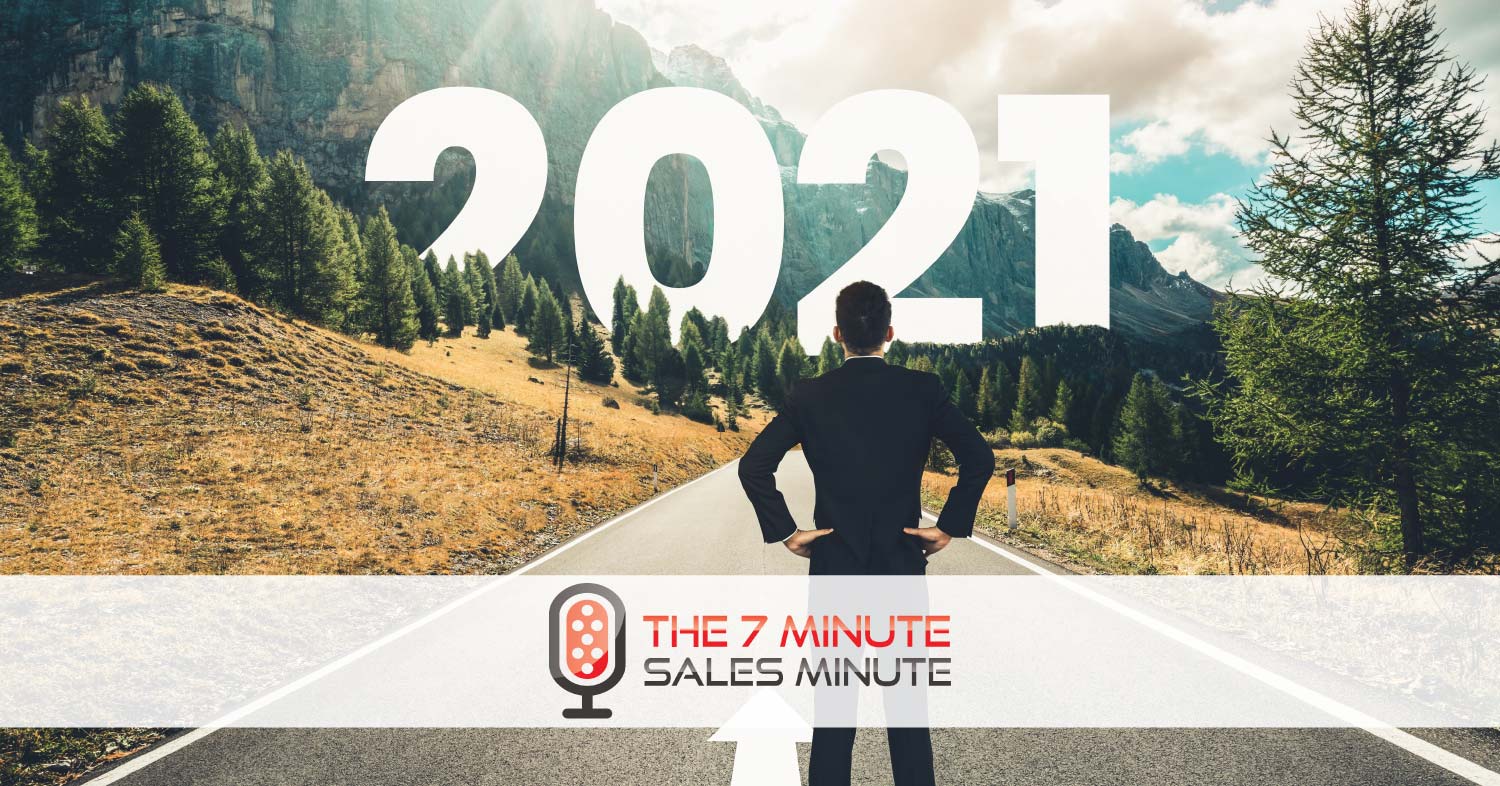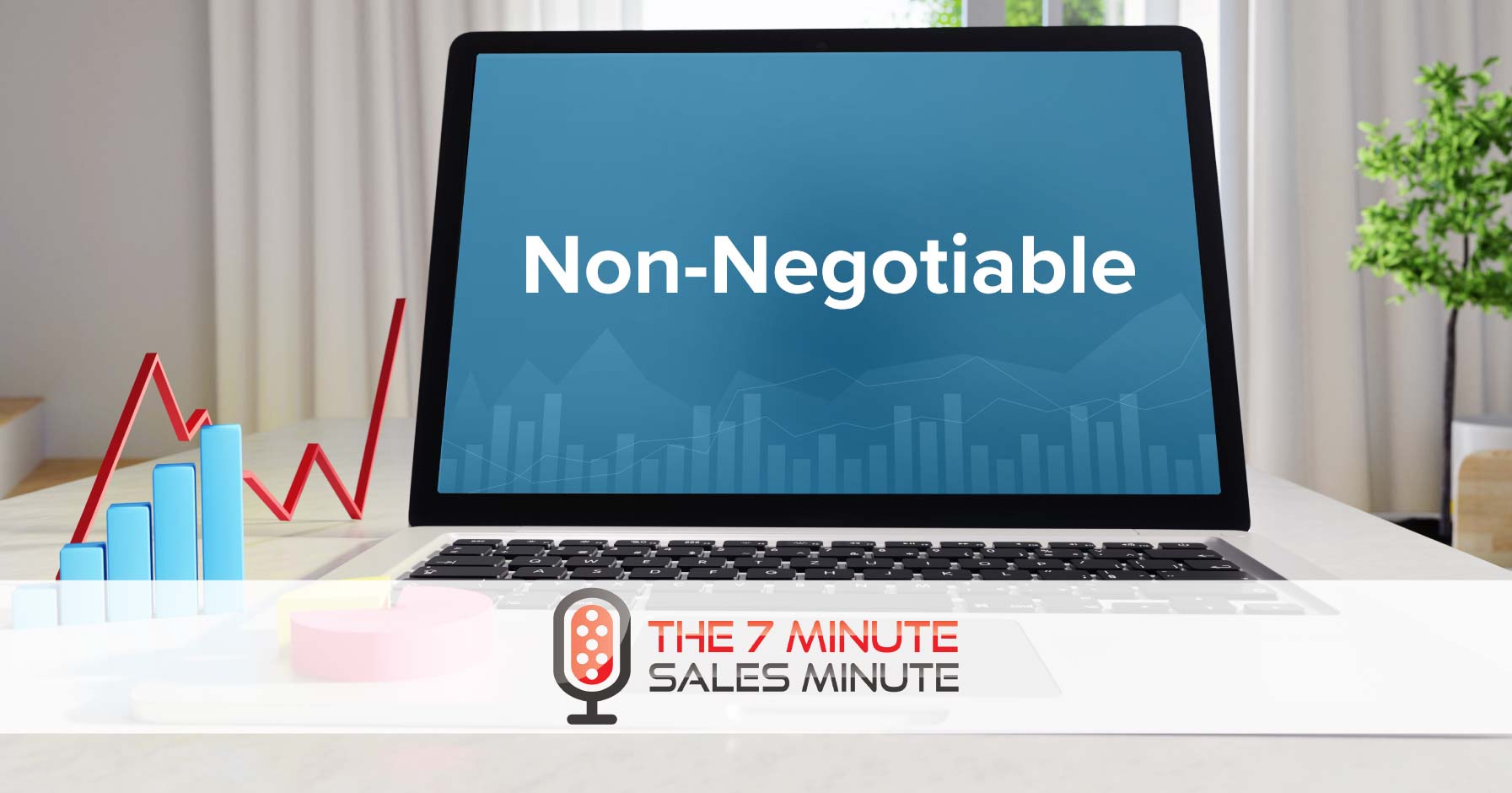
Read the transcript
Today’s episode of The Seven Minute Sales Minute is brought to you by Audible.com. Get a free audio book download and 30-day free trial at www.audibletrial.com/sevenminute. That’s www.audibletrial.com/sevenminute …
Jon Dwoskin: Thank you for joining us for another episode of the 7 Minute Sales Minute podcast, your bite-sized and easy-to-digest guide to jump-starting your sales career and putting you on the road to gaining more prospects, more clients, more business, and, ultimately, more income. What’s up Fish?
Scott Fishman: Not much. What’s going on Jonny?
Jon Dwoskin: Not much, not much. Looking forward as always to do another podcast together and share great information for our listeners.
Scott Fishman: Yeah, for sure. I mean, it’s been a few weeks. We’ve had some stuff going on.
Jon Dwoskin: Right, right. For those of you who are looking to start a podcast or do anything in business, it’s always good to front load a lot of stuff. Scott and I, I think the last five episodes, we did in one day, so we were able to shoot it out to everybody on a weekly, bi-weekly basis, and now we’re doing some more.
Scott Fishman: Now we’re all caught up and we got to fill in.
Jon Dwoskin: It’s good to be back.
Scott Fishman: Yeah, for sure.
Jon Dwoskin: So, what should we talk about today?
Scott Fishman: I was thinking about it and we talked a little bit where we tried to do a podcast while I was on vacation and then we thought we might do one while you were on vacation, so this is still a topic I wanted to speak on. And, we’ve all had those nightmare clients and nightmare customers and I think we all know the type, and I found myself, on my vacation, actually becoming that person.
Jon Dwoskin: What happened?
Scott Fishman: I went to a foreign country and I did not get the service that I expected up front.
Jon Dwoskin: Right.
Scott Fishman: And, so I started to get frustrated and the way I was acting was not me. I’m usually very happy-go-lucky, easy going, and I’m not real picky and it really brought out the worst of me and I started to think like, gosh, we’re on the first day of this week. I’m going to be spending it at the resort and already I’m that guy.
Jon Dwoskin: Right.
Scott Fishman: I was thinking about like are my clients, when I have those nightmare clients or that one client who is the one-off who just needs everything and is super-high maintenance and just all over me, is that something that maybe I created? Chicken and egg, you know?
Jon Dwoskin: Right.
Scott Fishman: I started to think about that a little bit. Do I create that in my clients? Maybe it’s something I say sometimes upfront that turns them into a Frankenstein’s monster.
Jon Dwoskin: Right. Well first let me just say, I think it was really insightful for you to even recognize that and I think that’s the first thing for people in sales to do because everybody thinks it’s always the other person.
Scott Fishman: Right. The first step is admitting you have a problem, Jon.
Jon Dwoskin: Right. I could see you were going to say that – cause I saw you smiling when I did say that – but it’s true because I think so many people (and having managed people and you’ve managed people, too) how often do people come into your office and just play the blame game and the finger pointing?
Scott Fishman: Right.
Jon Dwoskin: Right.
Scott Fishman: No, I totally agree with that. I just started thinking about maybe having a little bit more empathy with those people and then if we do have that behavior coming at us from a client, maybe we can actually take a step back and put ourselves in their shoes for a little bit.
Jon Dwoskin: Right, right. I think sometimes easier said than done because, it’s interesting, I was talking to a client of mine today and one of the things he was saying was how disconnected he felt to some of the people in his company but also, he was saying that he was just burnt out and if burned-out-ness was creating, really he was creating the whole disconnect.
Scott Fishman: Right.
Jon Dwoskin: It was … he needed a jolt of new ideas and new thoughts and new perspectives so he wasn’t so disconnected, but it was pretty much his fault and he knew it.
Scott Fishman: That’s interesting that he, like you had said, it’s interesting that he actually recognized that himself.
Jon Dwoskin: Yeah. Empathy, I think, and I know you’ll agree, is probably one of the most important characteristics in a salesperson. So, how do you find that empathy when you’re just not feeling empathy?
Scott Fishman: I think it’s big and there actually was a study that was done. This guy who came and talked to our company actually, he was in a leadership position or a leadership conference that we did, and he talked about how we go temporarily insane when something happens to us.
Jon Dwoskin: Right.
Scott Fishman: You know, they say everyone’s got a plan until they get punched in the face and it’s just like that. If you go in and you get rattled, someone shakes you up, something bad happens, something good happens, for that matter, but for 17 minutes, you lose your faculties. The course all takes over in our brains and we’re not thinking straight.
Jon Dwoskin: Let me just recap, so the minute you lose control, the reason you kind of go temporarily insane and you lose kind of your whole whatever, and then the 17 minutes following that?
Scott Fishman: Right. Until you let 17 minutes or so pass, you’re completely off.
Jon Dwoskin: What was his suggestion to do during those 17 minutes?
Scott Fishman: Take a break. Walk away.
Jon Dwoskin: Wow. That to me is worth the price of listening to every podcast that we’ve ever done … That is huge. That is the remedy. The 17-minute walk away remedy.
Scott Fishman: Right.
Jon Dwoskin: Wow.
Scott Fishman: Listen to two-and-a-half episodes of the Seven Minute Sales Minute.
Jon Dwoskin: Oh, yeah. I’m going to start using that all the time. I’ve never heard that. That’s brilliant. So at the 18th minute, what did he say? You can come back and you’re ready to go?
Scott Fishman: Yeah, now you’re thinking straight. Think about like things, maybe your wife says something to you or your kids do something and you have that snap back. Think about what happens 10, 15 minutes later. Do you have that little bit of regret? Maybe.
Jon Dwoskin: Right.
Scott Fishman: You’ll be like why did I say that? That sort of thing.
Jon Dwoskin: Wow, I hate that. Right. Those reality show moments where you think if my life was recorded, the whole world would think I’m just an asshole.
Scott Fishman: Yes.
Jon Dwoskin: When it’s just, you know, we all have bad moments and none of us want to be judged by those moments, so this to me is, I’m going to use this about 10,000 times by the end of the year.
Scott Fishman: Absolutely. And, it’s funny because you know what? I had that little blow up at the resort on day one and no one really saw it. It was me and a couple of staff.
Jon Dwoskin: Right.
Scott Fishman: I think there was this guy. He was a shortish guy, a little bald with a big goatee, like a ZZ Top goatee.
Jon Dwoskin: Right.
Scott Fishman: He was looking at me like that guy’s really pissed and I kept seeing him everywhere for the whole week. I kept trying to find a reason to talk to him and let him know I wasn’t that a-hole, but it was just so funny cause finally on the very last morning, I struck up a conversation with him and his wife and I hopefully redeemed myself in his eyes a little bit, but I had that temporary insanity. I felt it where I was just out of control for a minute and I was not proud of it and I can see how clients can get that way. We don’t have that empathy, don’t put ourselves in their shoes how we can make it worse.
Jon Dwoskin: I just, I can’t think of anything off the top of my head, but I’ve had plenty of those moments where I find myself going back and apologizing for my behavior, but now thinking about the whole 17 minute solution, that’s brilliant.
Scott Fishman: It really is.
Jon Dwoskin: It’s brilliant, but also thinking about our reactions to when clients call us or we call a client if they’re in that 17 minutes.
Scott Fishman: Yes.
Jon Dwoskin: As far as us accessing the salespeople empathy, if I call somebody that I’m prospecting, all right, cause you and I both prospect all the time for our businesses, so there’s people that I do proposals for, I’ll follow up, and sometimes when I call them, they sound kind of cranky and I think it’s just human nature to think like maybe they just don’t want to use my services, which is fine. You kind of feel a little bit like a loser, but really you also maybe take a step back and think: Wait, maybe they’re in their 17 minutes of something.
Scott Fishman: Yes, and how can we help them get out of that and that’s something I think about because, you’ve known me forever, and if I recognize someone might be in that period, I might actually wait a little bit.
Jon Dwoskin: Right. Wait. I want to tell you a story. So, for those of you who are listening, I’m Jewish. My son just had his bar mitzvah, which means he turned 13 and in the Jewish religion, he’s considered a man. He just had his bar mitzvah. Scott and his wife were at the bar mitzvah, but about three weeks before the bar mitzvah, I had to call the caterer. You saw, as far as the hors d’oeuvres and the food, I had to call the caterer and ask him a question.
My relationship with him is great, was great, but I called him to clarify a couple things about the menu and he was such a dick on the phone. Every time I kept on asking him a question, he was so rude, and I’m thinking I’m spending money with this guy! He’s feeding our guests. He was so rude, so I just said to him, I called him by his name, and I said, “Dude, why are you so cranky?” I told him I want to put on our buddy, Dan, so he said, “What did you just say to me?” I said, “Why are you so cranky?” He goes, “No one’s ever asked me why I’ve been cranky.” I said, “Well, you’re so cranky. I mean, usually when we talk, we’re laughing about stuff.” He’s like, “Well, I just have a lot on my plate.” I said, “Well, Dude, I’m throwing a bar mitzvah. I got a lot on my plate, too. Stop being so cranky.” Now, every time after I talked to him, we laughed about it the whole time. So, just to prove your point, I think it’s great to call people out on their horse shit if you can.
Scott Fishman: Right.
Jon Dwoskin: Right. Get ‘em out of their 17 minutes. We have a responsibility.
Scott Fishman: Yeah, get ‘em to laugh a little bit. I’m kind of famous for doing the opposite. I call someone at 9:13 a.m. and be like, “I’m on a conference call!” I’m like, “Okay, first of all, I’m about to walk into a meeting. Okay, no meeting starts at 9:13am. I mean, come on, and why did you answer the phone if you’re in a meeting, all right?”
Jon Dwoskin: Right.
Scott Fishman: That’s the big one, “I’m in a meeting.” No, you’re not. You wouldn’t have picked up your phone if you were in a meeting, Dude. Come on.
Jon Dwoskin: That’s great. That’s great. I love it. Calling people out in a fun, tactful way when you call ‘em and they’re cranky because we’re going to assume that it’s not that they don’t want to talk to us, we’re going assume that they are in their 17 minute post-temporarily-insane environment and it’s our, then, responsibility as salespeople to make them laugh, get them back into themselves with empathy and humor and then on to selling them our services.
Scott Fishman: Exactly.
Jon Dwoskin: I love it.
Scott Fishman: You’re picking up exactly what I’m putting down, man.
Jon Dwoskin: I love it. I love it. I’d never heard of this and this is a huge learn for me out here.
Scott Fishman: I’ll give you the book, but it’s a snoozefest.
Jon Dwoskin: Is it?
Scott Fishman: The book that he wrote was, it was above my pay grade, to say the least.
Jon Dwoskin: To me, this is the best part of it all.
Scott Fishman: Right, absolutely.
Jon Dwoskin: It’s kind of like, and I think we may have talked about this book, but one of my favorite books is Herb Cohen, You Can Negotiate Anything. I feel like we’ve talked about it on this podcast, but my favorite part of the book is that it talks about when you lose control. I’m going to give the best tip of the whole book: When you’re on a call and you lose control, you hang up on yourself talking. You basically say, “Hey, Scott. This is Jon,” and then you ask me a question and I can’t answer it or something and I get nervous, I say, “Well, um, let me just tell you about-” Click. Then you hang up on yourself. You maintain your post. You’re not temporarily insane, but you’re temporarily anxious. You collect yourself and then you call the person back and say, “Sorry, I’m not sure what happened,” because nobody would think that you would hang up on yourself.
Scott Fishman: Wow, I love that.
Jon Dwoskin: That’s a tip from the book. So, there you go. 2 books. People could’ve just read two books in two minutes.
Scott Fishman: There you go.
Jon Dwoskin: There you go. Wow, all right. So, what else? How was the rest of your vacation?
Scott Fishman: It was amazing.
Jon Dwoskin: Yeah, so you didn’t let it ruin your vacation?
Scott Fishman: No, not at all. The only thing I felt bad about was that I was that guy for a few minutes and then I had to make up for it, so I had to be the super nice guy to every person who was on the staff afterwards.
Jon Dwoskin: Right. Balance the karma of the experience and that’s great. What else should we talk about? I think that information is such quality content, for everybody to recognize that they got to take a 17-minute break after they’re temporarily insane.
Scott Fishman: Right. I don’t know if there’s much else to talk about. I did want to actually bring one thing up, Jon.
Jon Dwoskin: Yeah.
Scott Fishman: We do have a sponsor: audible.com.
Jon Dwoskin: Yes, we do, yes.
Scott Fishman: You can get to audibletrial.com/sevenminute and get a free audible book download.
Jon Dwoskin: That’s a huge thing. I just want to say this about audible.com. I am listening to a book right now called #AskGaryVee. I was telling you about this. Gary-
Scott Fishman: Vaynerchuk.
Jon Dwoskin: Vaynerchuk. I just listened to Crush It. I’m listening to #AskGaryVee. It’s an incredible book. I recommend listening to the book over reading the book, I think, just because he’s so much fun to listen to. He’s got a great YouTube channel and his book is just easy, easy, easy to listen to and it’s filled with tons of great information.
Scott Fishman: Does he narrate his own book?
Jon Dwoskin: Yeah, he does. Yeah. I know, from what I understand, it is not easy to narrate your own book, as far as the rules of doing that, and I know because, I don’t know if I told you this, a publisher recently reached out to me and I’m starting a contract this week to write a book and I don’t want to mention the name of the publishing company yet until it’s signed, but they were telling me how difficult it is to, and the rules around reading it. That’s why most people have somebody read the book for them.
Scott Fishman: Gotcha.
Jon Dwoskin: Anyway, more of that to come. In the meantime, I just want to say my closing comment and you give yours, is that’s some of the best sales advice I’ve ever heard: To take 17 minutes after you have had a fight with a client, an argument with a client, a disagreement, a disagreement with somebody you’ve worked with, if you’re annoyed with somebody you work with, your manager, your boss, your colleagues, don’t go from that environment to then pound the phones. Go do something. Take a walk for 17 minutes and defuse so in that 18th minute, you’re ready to rock and roll and pound the phones and go see client. It’s almost better if you had a phone call with a client and you’re in the parking lot, it’s almost better to say, “Hey, I’m running 20 minutes late,” instead of show up with your shitty self. Shake it off and bring your best self to the table.
Scott Fishman: I like it. That’s great advice Jonathan.
Jon Dwoskin: Yeah, any closing remarks from you?
Scott Fishman: No. I think we’ve pretty much summed it up. I think this is a great episode and I’m excited to put it out there and thank you for doing this this evening. I know our schedules have been a little bit conflicting, so I’m glad we’re able to get it done today.
Jon Dwoskin: Right and then I think it’s important to also this year, because I’d love to infuse any entrepreneurial stuff that anybody wants to do in the future, but Scott and I, we’re having trouble connecting calendars, so we’re actually doing this podcast via Google Hangouts live and then we’re videoing it, but then we’re going to take it and post the audio as a podcast. So, no excuses. If you want to do a podcast with somebody, it’s pretty easy.
Scott Fishman: Yeah, absolutely.
Jon Dwoskin: Yeah. All right, well, have a great night everybody.
Scott Fishman: Yeah, thank you. Have a good night.
Jon Dwoskin: All right, take care … Thank you for listening to this episode of The Seven Minute Sales Minute. For show notes and worksheets pertaining to this week’s show, check us out at the sevenminutesalesminute.com. Take today’s strategies and run with them. Increase your sales and increase your income.




